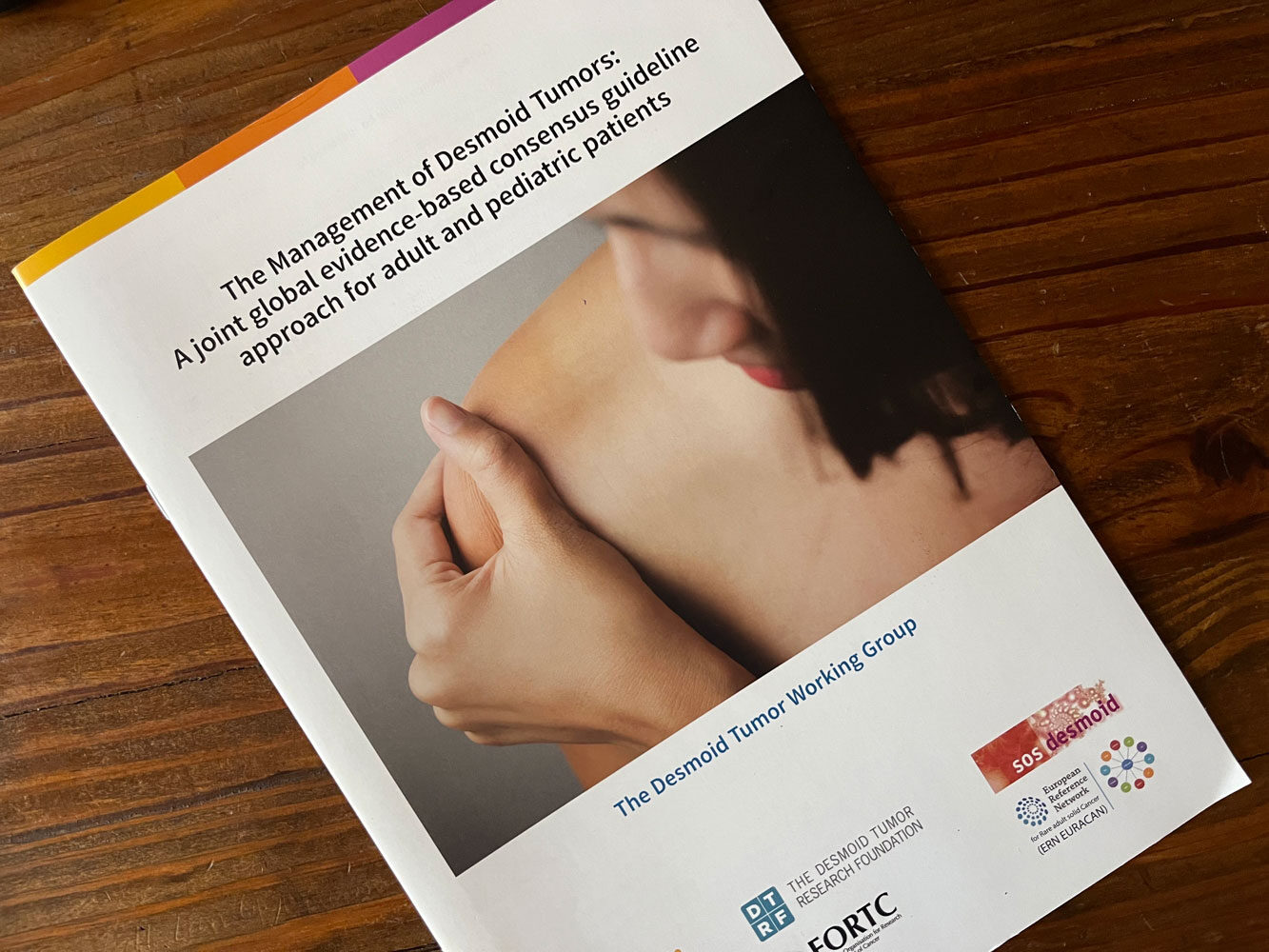An Evidence-Based Consensus for Desmoid Tumor Management
The Global Consensus Paper, partially funded by a DTRF grant, is a powerful resource for desmoid tumor patients, caregivers, and medical professionals. The paper provides answers to critical questions regarding recommended treatments, types of treatments, and pain management. Please see an update below which was published in June of 2024.

Entitled “The Management of desmoid tumors: A joint global consensus-based guideline approach for adult and paediatric patients,” the Paper was published in March 2020 in the European Journal of Cancer and in October 2020, in the ACS Journals.
Read the Global Consensus Paper
Scroll down to access the 2024 revision to the Global Consensus Paper.
This booklet was derived from the Global Consensus Paper.
Update to Global Consensus Paper
In June 2024, a revision to the Global Consensus Paper on desmoid tumor management was published thanks to the hard work and collaboration of an international group of physicians, scientists, and patient advocates (collectively known as “The Desmoid Tumor Working Group”). Peter Hohenberger, MD, PhD, Bernd Kasper, MD, PhD, and Alessandro Gronchi, MD, also DTRF Advisory Board members, led the group on this project.
Please note: Currently, the updated paper is only accessible with a subscription through JAMA Oncology. After one year, a full version will be publicly available. Patient guidelines are being developed, and we’re hopeful they will be published by early 2025, at which point we will make ammendments to the rest of this page to reflect this update.
Guiding a Standard of Care
The Global Consensus Paper evaluates existing evidence from prior scientific publications and incorporates the input of desmoid tumor experts worldwide, making it the first international evidence-based consensus of its kind for treatment of desmoid tumors.
There are varying treatments used for desmoid tumors and access to medical therapies and information varies by country. Many patients are treated based on the experience and expertise of a single physician, which may be limited. We have made it a priority to improve this situation by making this collaborative paper available to physicians and patients worldwide.
The Consensus Guidelines on Desmoid Tumor Treatment
According to the Paper, active surveillance – a period of observing the tumor without intervention – is the “well-established primary approach to primary/recurrent sporadic/familial desmoid tumours. Surgery is the accepted second-line treatment only for sporadic desmoid tumors located in the abdominal wall failing observation.”
As shown in the treatment algorithm chart from the Paper, if further treatment is needed it is generally guided according to the anatomical site. The decision should be made with the patients in a stepwise approach:
- For abdominal wall desmoid tumors, surgery is still the first option in case of progression.
- For intra-abdominal / retroperitoneal / pelvic desmoid tumors, systemic therapy should be considered as the first treatment option.
- For extremity / girdles / chest wall desmoid tumors, again surgery should not be the first treatment option unless the expected morbidity is very low (and only following MDT discussion); medical therapy should be administered preferably. Besides surgery, radiotherapy and medical therapy, isolated limb perfusion (ILP) may be part of the further treatment strategy in this location.
- For head & neck / intrathoracic desmoid tumors, medical therapy is generally considered the first line option.
Abbreviations:
5x: Surgery
Sx*: Surgery is an option if mobility is limited
MTx: Medical treatment
RTx: Radiotherapy
ILP: Isolated limb perfusion.
“[The Global Consensus Paper is] a gem!!! It literally travels with me to every medical appointment and is read and re-read prior to all appointments with doctors. This document is highlighted in multiple colors, pages dog eared, and paragraphs and charts flagged. This consensus guideline paper has worked for us to guide and empower us and often to redirect/revisit comments or to ask clarifying follow up questions.”
– Caregiver living in Arizona

Bernd Kasper, MD, PhD
“An Overview of Medical Desmoid Tumor Treatments”
with Dr. Bernd Kasper, Mannheim University Medical Center, Germany - DTRF Patient Meeting Webinar #1
Thanks to our collaborators and donors, we’ve helped hundreds of patients and physicians advocate for better care.
The Global Consensus Paper would not have been possible without the hard work and collaboration of an international group of physicians, scientists, and patient advocates.
This paper is the result of a 2018 DTRF grant entitled “An evidence-based consensus on the treatment of desmoids/aggressive fibromatosis.” This essential research relies on donor support. Please consider supporting initiatives like this with a donation to the DTRF.
Continue Exploring

Stay Up to Date as We Uncover More About Desmoid Tumors
